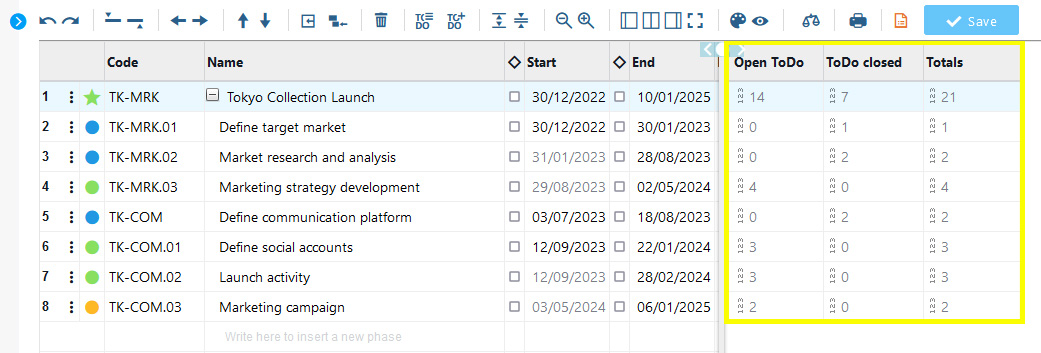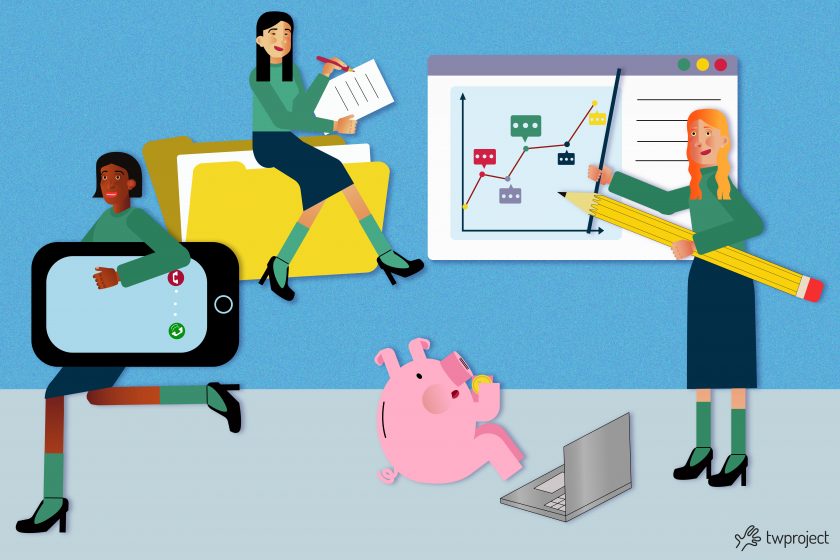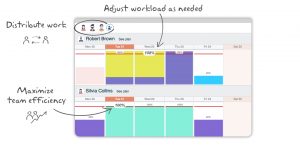Managing activities and projects can be very stressful.
Project managers are responsible for delivering projects on time, within budget, and on schedule and for managing limited resources.
High-stress levels can affect an individual’s cognitive and behavioral performance. This is why stress management for PMs and their teams becomes critical.
So, let’s look at the strategies for managing project activities without stress.
8. Effective team management
Successful team management is central to the success of a project or business and can also help project managers manage stress and anxiety.
The role of a project manager can be stressful, and the pressure to deliver results can lead to burnout and other mental health problems. Yet, with proper team management, creating a positive team environment that supports everyone’s mental well-being is possible.
How important it is to have project manager software to manage stress-free activities
Project management software such as Twproject is a must-have tool for any project manager who wants to manage tasks efficiently and minimize stress.
It lets you plan and monitor each project phase, ensuring a clear and organized overview.
Access to features such as schedule creation, task assignment, resource monitoring, and risk management provides complete control over all activities.
Moreover, integrating communications and documentation within one software reduces the need to switch from one tool to another, greatly simplifying daily work and reducing the risk of losing important information.
The transparency and ease of use offered by Twproject allow for anticipating and resolving any issues quickly, thus preventing stress from building up.
The bottom line is that excellent project management software such as Twproject not only makes operational project management easier but also helps create a more peaceful and productive work environment by reducing anxiety and stress.
Plan your projects with Twproject
5. Time management
Sound time management is key for both the PM and their team. This means creating a realistic work schedule, prioritizing tasks, and focusing on one task at a time. It is also important to take regular breaks to prevent burnout.
6. Setting realistic goals
Sometimes, the volume of work a project manager and team have to do appears to be much bigger than it actually is. Determining objectives following the SMART method makes it possible to see more clearly what needs to be done.
In fact, the SMART framework helps to set specific, measurable, achievable, relevant, and time-bound goals.
7. Emotional intelligence
Awareness of your and others’ emotions can help you communicate more effectively. It also helps to settle conflicts and build trust. Most importantly for a project manager, improving emotional intelligence can help one become a better leader.
People with higher levels of emotional intelligence are more rugged and resilient and less likely to burn out or suffer from hopelessness.
Developing self-management and self-regulation skills does not guarantee that you won’t experience anger or other strong emotions, but it does allow you to avoid letting your actions become dictated by feelings uncontrollably.
8. Effective team management
Successful team management is central to the success of a project or business and can also help project managers manage stress and anxiety.
The role of a project manager can be stressful, and the pressure to deliver results can lead to burnout and other mental health problems. Yet, with proper team management, creating a positive team environment that supports everyone’s mental well-being is possible.
How important it is to have project manager software to manage stress-free activities
Project management software such as Twproject is a must-have tool for any project manager who wants to manage tasks efficiently and minimize stress.
It lets you plan and monitor each project phase, ensuring a clear and organized overview.
Access to features such as schedule creation, task assignment, resource monitoring, and risk management provides complete control over all activities.
Moreover, integrating communications and documentation within one software reduces the need to switch from one tool to another, greatly simplifying daily work and reducing the risk of losing important information.
The transparency and ease of use offered by Twproject allow for anticipating and resolving any issues quickly, thus preventing stress from building up.
The bottom line is that excellent project management software such as Twproject not only makes operational project management easier but also helps create a more peaceful and productive work environment by reducing anxiety and stress.
Plan your projects with Twproject
4. Communicating and collaborating
When someone is stressed and anxious, he or she is more likely to act impatiently, which can negatively impact communication skills.
Those who experience intense emotions may find it difficult to express themselves appropriately with others.
Hence, one way to avoid stress and anxiety is through open communication. Instead of waiting until burnout, a project manager or team members should tell people when something is not going right.
This means communicating any problems or delays as soon as possible and asking for clarification when necessary. Proactive communication will help prevent misunderstandings and keep projects on track.
Issues and problems can be handled objectively without letting emotions and hurry get in the way. Regular check-ins, status updates, and active listening should be implemented in every project.
5. Time management
Sound time management is key for both the PM and their team. This means creating a realistic work schedule, prioritizing tasks, and focusing on one task at a time. It is also important to take regular breaks to prevent burnout.
6. Setting realistic goals
Sometimes, the volume of work a project manager and team have to do appears to be much bigger than it actually is. Determining objectives following the SMART method makes it possible to see more clearly what needs to be done.
In fact, the SMART framework helps to set specific, measurable, achievable, relevant, and time-bound goals.
7. Emotional intelligence
Awareness of your and others’ emotions can help you communicate more effectively. It also helps to settle conflicts and build trust. Most importantly for a project manager, improving emotional intelligence can help one become a better leader.
People with higher levels of emotional intelligence are more rugged and resilient and less likely to burn out or suffer from hopelessness.
Developing self-management and self-regulation skills does not guarantee that you won’t experience anger or other strong emotions, but it does allow you to avoid letting your actions become dictated by feelings uncontrollably.
8. Effective team management
Successful team management is central to the success of a project or business and can also help project managers manage stress and anxiety.
The role of a project manager can be stressful, and the pressure to deliver results can lead to burnout and other mental health problems. Yet, with proper team management, creating a positive team environment that supports everyone’s mental well-being is possible.
How important it is to have project manager software to manage stress-free activities
Project management software such as Twproject is a must-have tool for any project manager who wants to manage tasks efficiently and minimize stress.
It lets you plan and monitor each project phase, ensuring a clear and organized overview.
Access to features such as schedule creation, task assignment, resource monitoring, and risk management provides complete control over all activities.
Moreover, integrating communications and documentation within one software reduces the need to switch from one tool to another, greatly simplifying daily work and reducing the risk of losing important information.
The transparency and ease of use offered by Twproject allow for anticipating and resolving any issues quickly, thus preventing stress from building up.
The bottom line is that excellent project management software such as Twproject not only makes operational project management easier but also helps create a more peaceful and productive work environment by reducing anxiety and stress.
Plan your projects with Twproject
3. Prioritizing and delegating task
Most project managers feel overwhelmed by the workload.
They can delegate those low-priority duties to other team members by weighing which tasks are most important and urgent.
The strategy here is to make a to-do list and prioritize its content. It goes without saying that completing urgent tasks as soon as possible will make the rest of the day more pleasant and relaxed. Also, prioritizing and delegating tasks can foster teamwork and trust among team members.

4. Communicating and collaborating
When someone is stressed and anxious, he or she is more likely to act impatiently, which can negatively impact communication skills.
Those who experience intense emotions may find it difficult to express themselves appropriately with others.
Hence, one way to avoid stress and anxiety is through open communication. Instead of waiting until burnout, a project manager or team members should tell people when something is not going right.
This means communicating any problems or delays as soon as possible and asking for clarification when necessary. Proactive communication will help prevent misunderstandings and keep projects on track.
Issues and problems can be handled objectively without letting emotions and hurry get in the way. Regular check-ins, status updates, and active listening should be implemented in every project.
5. Time management
Sound time management is key for both the PM and their team. This means creating a realistic work schedule, prioritizing tasks, and focusing on one task at a time. It is also important to take regular breaks to prevent burnout.
6. Setting realistic goals
Sometimes, the volume of work a project manager and team have to do appears to be much bigger than it actually is. Determining objectives following the SMART method makes it possible to see more clearly what needs to be done.
In fact, the SMART framework helps to set specific, measurable, achievable, relevant, and time-bound goals.
7. Emotional intelligence
Awareness of your and others’ emotions can help you communicate more effectively. It also helps to settle conflicts and build trust. Most importantly for a project manager, improving emotional intelligence can help one become a better leader.
People with higher levels of emotional intelligence are more rugged and resilient and less likely to burn out or suffer from hopelessness.
Developing self-management and self-regulation skills does not guarantee that you won’t experience anger or other strong emotions, but it does allow you to avoid letting your actions become dictated by feelings uncontrollably.
8. Effective team management
Successful team management is central to the success of a project or business and can also help project managers manage stress and anxiety.
The role of a project manager can be stressful, and the pressure to deliver results can lead to burnout and other mental health problems. Yet, with proper team management, creating a positive team environment that supports everyone’s mental well-being is possible.
How important it is to have project manager software to manage stress-free activities
Project management software such as Twproject is a must-have tool for any project manager who wants to manage tasks efficiently and minimize stress.
It lets you plan and monitor each project phase, ensuring a clear and organized overview.
Access to features such as schedule creation, task assignment, resource monitoring, and risk management provides complete control over all activities.
Moreover, integrating communications and documentation within one software reduces the need to switch from one tool to another, greatly simplifying daily work and reducing the risk of losing important information.
The transparency and ease of use offered by Twproject allow for anticipating and resolving any issues quickly, thus preventing stress from building up.
The bottom line is that excellent project management software such as Twproject not only makes operational project management easier but also helps create a more peaceful and productive work environment by reducing anxiety and stress.
Plan your projects with Twproject
The key to stress-free work management is effective planning and organization.
This means establishing a clear project roadmap, breaking down activities into manageable tasks, and assigning responsibilities to team members.
Using project management tools such as Twproject can help keep track of tasks and deadlines.
2. Practicing mindfulness
Mindfulness is a form of meditation that involves focusing on the present moment to minimize and control negative emotions.
Mindfulness focuses on awareness of oneself and the present moment. Practicing mindfulness can help you stay grounded and calm, focus on your “now” without allowing negativity to control you, and reduce stress.

3. Prioritizing and delegating task
Most project managers feel overwhelmed by the workload.
They can delegate those low-priority duties to other team members by weighing which tasks are most important and urgent.
The strategy here is to make a to-do list and prioritize its content. It goes without saying that completing urgent tasks as soon as possible will make the rest of the day more pleasant and relaxed. Also, prioritizing and delegating tasks can foster teamwork and trust among team members.

4. Communicating and collaborating
When someone is stressed and anxious, he or she is more likely to act impatiently, which can negatively impact communication skills.
Those who experience intense emotions may find it difficult to express themselves appropriately with others.
Hence, one way to avoid stress and anxiety is through open communication. Instead of waiting until burnout, a project manager or team members should tell people when something is not going right.
This means communicating any problems or delays as soon as possible and asking for clarification when necessary. Proactive communication will help prevent misunderstandings and keep projects on track.
Issues and problems can be handled objectively without letting emotions and hurry get in the way. Regular check-ins, status updates, and active listening should be implemented in every project.
5. Time management
Sound time management is key for both the PM and their team. This means creating a realistic work schedule, prioritizing tasks, and focusing on one task at a time. It is also important to take regular breaks to prevent burnout.
6. Setting realistic goals
Sometimes, the volume of work a project manager and team have to do appears to be much bigger than it actually is. Determining objectives following the SMART method makes it possible to see more clearly what needs to be done.
In fact, the SMART framework helps to set specific, measurable, achievable, relevant, and time-bound goals.
7. Emotional intelligence
Awareness of your and others’ emotions can help you communicate more effectively. It also helps to settle conflicts and build trust. Most importantly for a project manager, improving emotional intelligence can help one become a better leader.
People with higher levels of emotional intelligence are more rugged and resilient and less likely to burn out or suffer from hopelessness.
Developing self-management and self-regulation skills does not guarantee that you won’t experience anger or other strong emotions, but it does allow you to avoid letting your actions become dictated by feelings uncontrollably.
8. Effective team management
Successful team management is central to the success of a project or business and can also help project managers manage stress and anxiety.
The role of a project manager can be stressful, and the pressure to deliver results can lead to burnout and other mental health problems. Yet, with proper team management, creating a positive team environment that supports everyone’s mental well-being is possible.
How important it is to have project manager software to manage stress-free activities
Project management software such as Twproject is a must-have tool for any project manager who wants to manage tasks efficiently and minimize stress.
It lets you plan and monitor each project phase, ensuring a clear and organized overview.
Access to features such as schedule creation, task assignment, resource monitoring, and risk management provides complete control over all activities.
Moreover, integrating communications and documentation within one software reduces the need to switch from one tool to another, greatly simplifying daily work and reducing the risk of losing important information.
The transparency and ease of use offered by Twproject allow for anticipating and resolving any issues quickly, thus preventing stress from building up.
The bottom line is that excellent project management software such as Twproject not only makes operational project management easier but also helps create a more peaceful and productive work environment by reducing anxiety and stress.
Plan your projects with Twproject
CONTENT
- Managing activities: 8 strategies to better deal with anxiety and stress
- 1.Planning and organizing
- 2.Practicing mindfulness
- 3.Prioritizing and delegating task
- 4.Communicating and collaborating
- 5.Time management
- 6.Setting realistic goals
- 7.Emotional intelligence
- 8.Effective team management
- How important it is to have project manager software to manage stress-free activities
Managing activities: 8 strategies to better deal with anxiety and stress
Managing activities stress-free may seem like a challenging feat. Among tight deadlines, challenging workflows, it is easy to feel overwhelmed.
However, project managers and teams can learn to manage activities efficiently and without stress with the right strategies.
1. Planning and organizing
The key to stress-free work management is effective planning and organization.
This means establishing a clear project roadmap, breaking down activities into manageable tasks, and assigning responsibilities to team members.
Using project management tools such as Twproject can help keep track of tasks and deadlines.
2. Practicing mindfulness
Mindfulness is a form of meditation that involves focusing on the present moment to minimize and control negative emotions.
Mindfulness focuses on awareness of oneself and the present moment. Practicing mindfulness can help you stay grounded and calm, focus on your “now” without allowing negativity to control you, and reduce stress.

3. Prioritizing and delegating task
Most project managers feel overwhelmed by the workload.
They can delegate those low-priority duties to other team members by weighing which tasks are most important and urgent.
The strategy here is to make a to-do list and prioritize its content. It goes without saying that completing urgent tasks as soon as possible will make the rest of the day more pleasant and relaxed. Also, prioritizing and delegating tasks can foster teamwork and trust among team members.

4. Communicating and collaborating
When someone is stressed and anxious, he or she is more likely to act impatiently, which can negatively impact communication skills.
Those who experience intense emotions may find it difficult to express themselves appropriately with others.
Hence, one way to avoid stress and anxiety is through open communication. Instead of waiting until burnout, a project manager or team members should tell people when something is not going right.
This means communicating any problems or delays as soon as possible and asking for clarification when necessary. Proactive communication will help prevent misunderstandings and keep projects on track.
Issues and problems can be handled objectively without letting emotions and hurry get in the way. Regular check-ins, status updates, and active listening should be implemented in every project.
5. Time management
Sound time management is key for both the PM and their team. This means creating a realistic work schedule, prioritizing tasks, and focusing on one task at a time. It is also important to take regular breaks to prevent burnout.
6. Setting realistic goals
Sometimes, the volume of work a project manager and team have to do appears to be much bigger than it actually is. Determining objectives following the SMART method makes it possible to see more clearly what needs to be done.
In fact, the SMART framework helps to set specific, measurable, achievable, relevant, and time-bound goals.
7. Emotional intelligence
Awareness of your and others’ emotions can help you communicate more effectively. It also helps to settle conflicts and build trust. Most importantly for a project manager, improving emotional intelligence can help one become a better leader.
People with higher levels of emotional intelligence are more rugged and resilient and less likely to burn out or suffer from hopelessness.
Developing self-management and self-regulation skills does not guarantee that you won’t experience anger or other strong emotions, but it does allow you to avoid letting your actions become dictated by feelings uncontrollably.
8. Effective team management
Successful team management is central to the success of a project or business and can also help project managers manage stress and anxiety.
The role of a project manager can be stressful, and the pressure to deliver results can lead to burnout and other mental health problems. Yet, with proper team management, creating a positive team environment that supports everyone’s mental well-being is possible.
How important it is to have project manager software to manage stress-free activities
Project management software such as Twproject is a must-have tool for any project manager who wants to manage tasks efficiently and minimize stress.
It lets you plan and monitor each project phase, ensuring a clear and organized overview.
Access to features such as schedule creation, task assignment, resource monitoring, and risk management provides complete control over all activities.
Moreover, integrating communications and documentation within one software reduces the need to switch from one tool to another, greatly simplifying daily work and reducing the risk of losing important information.
The transparency and ease of use offered by Twproject allow for anticipating and resolving any issues quickly, thus preventing stress from building up.
The bottom line is that excellent project management software such as Twproject not only makes operational project management easier but also helps create a more peaceful and productive work environment by reducing anxiety and stress.


